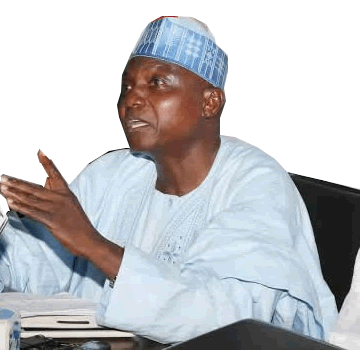Health
Nigeria First to Introduce New 5-in-1 Vaccine Against Meningitis – WHO

Nigeria has become the first country in the world to roll out a new vaccine – Men5CV – recommended by World Health Organisation(WHO), to protect people against meningitis.
The world health body, in a statement on Friday, said that the vaccine would protect people against five strains of meningococcus bacteria, and described Nigeria’s feat as historic.
It said that health workers would begin an immunisation campaign aimed at reaching one million people.
The statement said that the vaccine and emergency vaccination activities are funded by Gavi, the Vaccine Alliance, which funds the global meningitis vaccine stockpile and supports lower-income countries with routine vaccination against meningitis.
According to the WHO, Nigeria is one of the 26 meningitis hyper-endemic countries of Africa, situated in the area known as the African Meningitis Belt.
It noted that in 2023, there was a 50 per cent jump in annual meningitis cases reported across Africa.
“In Nigeria, an outbreak of Neisseria meningitidis (meningococcus) serogroup C outbreak, led to 1,742 suspected meningitis cases, including 101 confirmed cases and 153 deaths in seven of 36 Nigerian state, between October 2023 and March 2024.
The states are Adamawa, Bauchi, Gombe, Jigawa, Katsina, Yobe, Zamfara.
“To quell the deadly outbreak, a vaccination campaign was undertaken on 25–28 March 2024 to initially reach more than one million people aged 1-29 years,” it said.
The statement noted that meningitis was a serious infection that leads to the inflammation of the membranes (meninges), that surround and protect the brain and spinal cord.
“There are multiple causes of meningitis, including viral, bacterial, fungal and parasitic pathogens.
“Symptoms often include headache, fever and stiff neck. Bacterial meningitis is the most serious, and can also result in septicaemia (blood poisoning). It can seriously disable or kill within 24 hours,” the statement added.
It quoted Dr Tedros Ghebreyesus, WHO Director-General, as saying that meningitis was an old and deadly foe, adding that the new vaccine holds the potential to change the trajectory of the disease, preventing future outbreaks and saving many lives
“Nigeria’s rollout brings us one step closer to our goal of eliminating meningitis by 2030,” Ghebreyesus said.
He said that the revolutionary new vaccine offers a powerful shield against the five major strains of the meningococcal bacteria – A, C, W, Y and X – in a single shot.
All five strains cause meningitis and blood poisoning.
According to him, this provides broader protection than the current vaccine used in much of Africa, which is only effective against the A strain.
He said that the new vaccine has the potential to significantly reduce meningitis cases and advance progress in defeating meningitis.
“This is especially important for countries like Nigeria where multiple serogroups are prevalent.
“The new vaccine uses the same technology as the meningitis A conjugate vaccine (MenAfriVac®), which wiped out meningococcal A epidemics in Nigeria,” the WHO boss said.
The statement quoted Prof. Muhammad Pate, Nigeria’s Minister of Health and Social Welfare, as saying that Northern Nigeria, particularly the states of Jigawa, Bauchi and Yobe, were badly hit by the deadly outbreak of meningitis.
“This vaccine provides health workers with a new tool to both stop this outbreak and also put the country on a path to elimination,” Pate said.
According to him, Nigeria has done a lot of work preparing health workers and the health system for the rollout of the new vaccine.
“We got an invaluable support from our populations in spite of the fasting period, and from our community leaders, especially the Emir of Gumel in Jigawa, who personally launched the vaccination campaign in the state.
“We’ll be monitoring progress closely and hopefully expand the immunisation in the coming months and years to accelerate progress,” he said.
The minister said that the new multivalent conjugate vaccine took 13 years of efforts and was based on a partnership between PATH and the Serum Institute of India.
“Financing from the UK government’s Foreign, Commonwealth and Development Office was critical to its development,” he said.
Pate said that in July 2023, WHO prequalified the new Men5CV vaccine (which has brand name MenFive®), and in October 2023 issued an official recommendation to countries to introduce the new vaccine.
According to him, Gavi allocated resources for the Men5CV rollout in December 2023, which is currently available for outbreak response through the emergency stockpile managed by the International Coordinating Group (ICG), on Vaccine Provision.
He added that the roll-out, through mass preventive campaigns, was expected to start in 2025 across countries of the Meningitis Belt.
Mr Andrew Mitchell, UK Minister for Development and Africa, was also quoted as saying that the rollout of one million vaccines in northern Nigeria would help save lives, prevent long-term illness and boost the goal of defeating meningitis globally by 2030.
“This is exactly the kind of scientific innovation, supported by the UK, which I hope is replicated in years to come, to help us drive further breakthroughs, including wiping out other diseases,” Mitchell said.
He said that WHO has been supporting the Nigeria Centre for Disease Control and Prevention (NCDC), in responding to the meningitis outbreak in the country.
According to him, the areas of support include disease surveillance, active case finding, sample testing and case management.
“WHO and partners have also played a vital role in supporting Nigeria to prepare for the rollout of the new vaccine and training health workers,” he said.
Dr Nanthalile Mugala, PATH’s Chief of Africa Region, was also quoted as saying that meningococcal meningitis had tormented countries across Africa, year after year.
“The introduction of MenFive® in Nigeria heralds a transformative era in the fight against meningococcal meningitis in Africa.
“Building on the legacy of previous vaccination efforts, this milestone reflects over a decade of unwavering, innovative partnerships.
“The promise of MenFive® lies not just in its immediate impact but in the countless lives it stands to protect in the years to come, moving us closer to a future free from the threat of this disease,” Mugala said.
According to her, in 2019, WHO and partners launched the global roadmap to defeating meningitis by 2030.
“The roadmap sets a comprehensive vision towards a world free of meningitis, and has three goals including the elimination of bacterial meningitis epidemics.
Another goal is the reduction of cases of vaccine-preventable bacterial meningitis by 50 per cent and deaths by 70 per cent, as well as the reduction of disability and improvement of quality of life after meningitis, due to any cause.
Ms Aurélia Nguyen, Chief Programme Officer at Gavi, the Vaccine Alliance, was also quoted as saying that with outbreaks of infectious diseases on the rise worldwide, new innovations such as MenFive® were critical in helping the fight back.
She said that Vaccine Alliance funds the global stockpile as well as vaccine rollout in lower-income countries.
“This first shipment signals the start of Gavi support for a multivalent meningococcal conjugate vaccine (MMCV) programme which, with the required donor funding for our next five years of work, will see pentavalent meningococcal conjugate vaccines rolled out in high-risk countries.
“Thanks to vaccines, we have eliminated large and disruptive outbreaks of meningitis A in Africa, now we have a tool to respond to other serogroups that still cause large outbreaks resulting in long-term disability and deaths,” Nguyen said.
According to her, following Nigeria’s meningitis vaccine campaign, a major milestone on the road to defeat meningitis is the international summit on meningitis taking place in Paris in April 2024, where leaders will celebrate progress, identify challenges and assess next steps.
“It is also an opportunity for country leaders and key partners to commit, politically and financially, to accelerate progress towards eliminating meningitis as a public health problem by 2030,” she said.(NAN)
Health
TB: Nigeria’ exceeded WHO’s targets by 15% despite covid-19 – Experts

By Laide Akinboade, Abuja
The National Coordinator of the African Coalition on Tuberculosis in Nigeria, Ibrahim Umoru, recently said despite Coronavirus (Covid-19) challenges, Nigeria was able to exceed World Health Organisation, WHO’s by 15%.
Umoru stated this at the community sessions of the just concluded National TB conference in Abuja, where delegates from over 20 countries shared their country-specific experiences on TB elimination.
He emphasized the need for resources and commitment, as exemplified during the COVID-19 pandemic in achieving the goal of ending TB by 2030 in Nigeria.
He therefore urged for broader collaboration, political will and realignment of priorities, Umoru explained if well meaning corporations and individuals prioritized and champion TB cause like other causes, the end of TB fight is imminent.
According to Umoru, “With the right diagnostics, resources, and support, we can achieve the 2030 goal,” he said.
Similarly, Deborah Ike, the Executive Director of the Debriche Health Development Centre (DHDC), highlighting the challenges being confronting Nigeria in the fight against TB stress the need to break all barriers in order to meet the 2030 target for TB eradication.
Ike noted that a lot more needs to be done in the areas of education and awareness as stigmatization and discrimination remain major barriers.
“Even though testing and treatment are free in Nigeria, many still die because they’re afraid to access these services.
“Some people avoid seeking treatment because they fear being judged.
“Others have lost jobs due to TB, which not only worsens their economic situation but can also lead to further psychological and physical decline.”
Ike emphasized the critical need for effective information dissemination to combat stigma, adding that it is important for people to understand that a person on treatment can no longer spread the disease, unlike one who has refused to be treated.
“This knowledge will reduce fear, encourage treatment, and help cut the chain of transmission”.
A Director for Tuberculosis at Breakthrough Action Nigeria, Dr Bolatito Aiyedigba, highlighted some of the innovations used to increase case detection such as the Check Am slogan, to encourage community people to test their lingering coughs.
”Some of the innovations were introduced during the COVID-19 era, COVID came with cough and cough is usually associated with tuberculosis as well. So it could be tuberculosis. Not every cough is due to COVID, so check it.
”Cough is due to different kinds of illnesses. And until you check, you will not know. And we also worked with the national TB hotline, when they call, they are directed on what to do, asked more questions and their fears are allayed, so they can get the appropriate testing. So that really, really helped. In addition to all the other innovations that came into the facility, testing was also improved.”
Aiyedigba also informed that the stigmatisation of people living with TB is still very high in Nigeria, noting that the country needs to tackle the menace.
”This is the next line of action that we’re going to tackle. Because now we’re fighting the TB cases, we’re putting them on treatment but we have to address the issue of stigma.
”And the stigma starts from self-stigmatisation, there’s no need to stigmatise yourself for having tuberculosis because tuberculosis is curable and treatable.
National TB Conference is an annual event organisedthe Stop TB Partnership Nigeria. The 2024 edition , themed “Public-Private Partnership and Integrated Service Delivery: Panacea to End TB in Nigeria,” was organised by the Stop TB Partnership Nigeria in collaboration with the Federal Ministry of Health and Social Welfare.
The three day event brought together Representatives from Stop TB Partnership Geneva, public health experts, community and civil organisations, private and public stakeholders from across the world, amongst many others.
Health
Malnutrition: 40% children are stunted in 2023 – FG

By Laide Akinboade, Abuja
The Federal Government, FG, at the weekend revealed that about 40% of the 35 million under 5 children in Nigeria are stunted in 2023.Director and Head of Nutrition Department, Federal Ministry of Health and Social Welfare, Ladidi Bako-Aiyegbusi, revealed this at the 8 annual conference, organized by the Association of Nigeria Health Journalists, ANHeJ, in Abuja.
She said 8% are wasted, 27% are under weight, and 29% are Successfully breastfed, SBF. The theme for the two day conference was, ‘SWAP effectiveness in addressing poor health outcomes: The role of the media’.According to her, ” Globally, Nigeria is raved 2 and 1 in Africa in the number of children suffering from Severe Acute Malnutrition, SAM. Furthermore, research shows that, 31% of women consumed Iron and folic acid (IFA) supplements during pregnancy and out of the 35 million children under 5 years of age population, 14 million children are stunted while 3 million are wasted. “Out of 7 million children born per year in Nigeria 42% are breastfed within an hour of birth. 29% exclusively breastfed upto 6 months of age . 3% breastfed upto 23 months of age. 23% receive diverse diet (minimum 5 groups). 11% receive minimally acceptable diet . 26% vitamin A supplementation coverage” .Bako-Aiyegbusi, who enumerated the causes of malnutrition in Nigeria which include, inadequate food intake, lack of dietary.diversity , and infectious diseases. On what the federal government is doing, she said the government has done the revised National policy on food and nutrition in Nigeria which provide an overarching framework for multisectorial action, to reduce malnutrition in the country. Earlier, the FG also reiterated its commitment to accessible health policies and services that are geared towards achieving improved health outcomes in Nigeria.The Permanent Secretary, Federal Ministry of Health and Social Welfare, Daju Kachollom, who was represented by Dr. Angis Ikpe, of the policy and planning department of the Ministry, explained that in order to achieve improved health outcomes in the country, the Ministry have embraced the Sector-Wide Approach (SWAp) strategy to unify the efforts of thegovernment, partners, and stakeholders, maximizing impact, enhancingaccountability, and eliminating redundancies.According to Kachollom, the Nigeria Health Sector Renewal Investment Initiative (HSRIl) exemplifies the government unwavering commitment to revitalizing the health sector “Through targetedinvestments, we aim to strengthen primary healthcare (PHC) systems to deliver efficient maternal and child health services, tackle Neglected Tropical Diseases (NTDS), address Non-Communicable Diseases (NCDs), and confront infectiousdiseases. “These efforts also include a robust, ongoing response to HIV/AIDS andTuberculosis and Malaria.In the field of Maternal and Child Health, we remain unwavering in our commitmentto enhance service delivery and improve health outcomes.”The strengthening ofovision Primary Healthcare (PHC) systems, bolstered by the Basic Healthcare Provision Fund (BHCPF), has significantly increased access to vital services in underserved communities. Notably, the Maternal and Newborn Mortality Reduction InnovationInitiative (MAMII) exemplifies these efforts by offering free cesarean sections to eligible women, thereby improving maternal and neonatal outcomes.”The Permanent Secretary also commended the invaluablecontributions of health journalists in shaping public perception and holding stakeholders accountable, reaffirmed the government’s commitment to working hand-in- hand with the media in promoting health awareness, countering misinformation, andensuring transparency and accountability within the health sector.The Chief Executive Officer of the Institute of Human Virology Nigeria (IHVN), Dr Patrick Dakum, in his good will message commended ANHEJ’s consistency in sustaining the forum for the press and stakeholders in the health sector together, deliberate on pertinent issues, and forge a way forward for better health in Nigeria. Dakum noted that the theme of the conference is apt, as the importance of collaboration in strengthening health systems can not be overemphasized. He further said the IHVN remains committed to aligning its activities with the Government of Nigeria’s health sector plans. Recognising other roles of the media, such as holding the government accountable to its people and encouraging better domestic funding for health programs and research, commended ANHEJ for the initiative in ensuring that the health needs of all Nigerians are met. The President of ANHEJ, Mr Joseph Kadiri, earlier in welcome address, said theme of the conference is aimed at addressing the numerous challenges confronting Nigeria’s health sector, such as inadequate funding, inefficient resource allocation, and poor service delivery. “As journalists, we play a vital role in promoting health awareness, education, and advocacy. Through our reporting, we can hold stakeholders accountable for their actions and policies, provide a platform for marginalized voices to be heard, promote evidence-based health information and best practices, and advocate for policy changes and increased funding for health programs.”He noted that despite the media’s potential to enhance SWAp effectiveness, several challenges persist, including limited access to health information and data, inadequate training and capacity building for health journalists, and insufficient funding for health reporting and programming. The President further reiterates ANHEJ’s interest in supporting the federal government and development partners in the amplification of their activities through its health promotion reportage and programmes.Health
Nigeria Exceeds 2024 Health Insurance Target, Hits 95% of 2027 Goal – DG NHIA

The National Health Insurance Authority (NHIA) says 19.2 million citizens have enrolled into health insurance scheme surpassing its 2024 target
Dr Kelechi Ohiri, Director-General, NHIA, disclosed this in Abuja, at a Universal Health Coverage (UHC ), day commemoration roundtable to reflect on Nigeria’s UHC quest, identify challenges, and chart a course of action.
The roundtable was part of the activities lined up for the commemoration of the 2024 UHC Day
It was to reflect on Nigeria’s UHC quest, identify challenges, and chart a course of action.
Ohiri said this feat was a significant milestone in NHIA’s efforts to expand access to healthcare for Nigerians under health insurance scheme.
According to him, this achievement surpasses the 2024 target and places the nation at 95 per cent of its ambitious 2027 presidential coverage goal.
He attributed the success to strategic policy reforms, effective collaborations with stakeholders, and an unwavering commitment to universal health coverage (UHC)
“We are proud to announce that 19.2 million Nigerians have been covered by health insurance.
“This surpasses our 2024 target and places us within striking distance of achieving 95 per cent of the 2027 presidential target,” he said.
He said that the NHIA had worked tirelessly to implement innovative strategies.
“This include the expansion of the Basic Healthcare Provision Fund (BHCPF) and partnerships with state health insurance agencies to ensure affordable and accessible healthcare for all Nigerians, especially the most vulnerable populations,” he said.
According to him, the milestone reflects the Federal Government’s commitment to delivering quality healthcare as outlined in the National Health Act.
He urged state governments and private sector stakeholders to intensify efforts aimed at sustaining the momentum and bridging the remaining gaps in health insurance coverage.
He said that the achievement came amid ongoing challenges in Nigeria’s healthcare sector, including funding limitations, infrastructure deficits, and inadequate human resources
However, the NHIA boss expressed optimism, noting that the agency’s strategic roadmap for 2025–2027 includes scaling up digital enrollment processes and integrating informal sector workers into the insurance scheme.
“With the theme of this year’s UHC Day, health should reflect the type of government the country has and must make decisions that represent its aspirations.
“We should prioritise Primary Health Care,(PHC), as the bedrock of our health system,” he said.
Dr Muhammad Lawal, the Commissioner for Health, Yobe, said that UHC was a reality and we must work towards it.
Lawal said that there should be no negotiation for the health of the people, most especially the vulnerable segment of the population.
Dr Bolanle Olusola-Faleye of the USAID LHSS Project, said that it was a remarkable time to celebrate 2024 UHC Day with the presence of reforms such as the Sector Wide Approach (SWAP).
Olusola-Faleye said that SWAp had shown evidence of success in the states through the harmonised Annual Operational Plan (AOP), ensuring alignment of priorities.
Public health advocates have lauded the progress, describing it as a significant step toward achieving UHC in Nigeria.
Dr Garfa Alawode, Co-convener of the UHC2023 Forum, said that it was a commendable accomplishment.
Alawode, however, said that there was still more to do to ensure that every Nigerian can access affordable and quality healthcare services.
As Nigeria inches closer to its 2027 health insurance target, Alawode called for sustained political will, increased funding, and effective monitoring.
“This is to ensure that the gains are not only maintained but also translated into improved health outcomes for all citizens ” he said.
NAN recalls that UHC Day is a global advocacy day to raise awareness about the importance of equitable, affordable, and accessible healthcare for all individuals without financial hardship.(NAN)


















